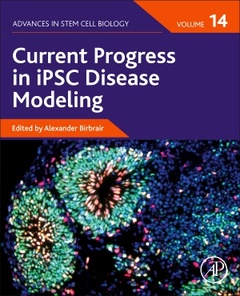Current Progress in iPSC Disease Modeling Advances in Stem Cell Biology Series
Coordonnateur : Birbrair Alexander

Current Progress in iPSC Disease Modeling, Volume Fourteen in the Advances in Stem Cell Biology series, is a timely and expansive collection of information and new discoveries in the field. This new volume addresses advances in research on how induced pluripotent stem cells are used for the creation of new tissues and organs. The creation of iPSC technology allowed the development of disease-specific human pluripotent stem cells. These cells allow researchers to study questions once impossible for some human diseases. This volume addresses iPSCs for vascular tissue engineering, bioprinting, derived lung organoids for pulmonary disorders, skeletal muscle engineering, human kidney organoids, and more.
It is written for researchers and scientists in stem cell therapy, cell biology, regenerative medicine and organ transplantation, and is contributed by world-renowned authors in the field.
1. Human Induced Pluripotent Stem Cell Modeling of Neurofibromatosis Type 1 2. Use of Inducible Pluripotent Stem Cells (iPSCs) to Model inflammatory Neurodegeneration and Repair in Multiple Sclerosis 3. iPSCs for Modeling Chronic Mountain Sickness 4. iPSCs for Modeling Noonan Syndrome, Noonan Syndrome with Multiple Lentigines, and Costello Syndrome 5. Modeling Mitochondrial Encephalopathy Due to Melas/Leigh Overlap Syndrome Using Induced Pluripotent Stem Cells 6. How iPSCs Changed the Research Status of Polycystic Ovary Syndrome 7. Modeling Inherited Retinal Dystrophies using Induced Pluripotent Stem Cells 8. Modeling Hereditary Spastic Paraplegias using Induced Pluripotent Stem Cells 9. Smith-Magenis Syndrome: From genetics to clinical presentation, disease pathogenesis and model systems 10. iPSCs for Modeling of Cardiac Arrhythmias 11. Modelling heritable kidney disease using human iPSC-derived kidney organoids
- Provides an overview of the fast-moving field of stem cell biology and function, regenerative medicine and therapeutics
- Covers advances in research on how induced pluripotent stem cells are used to create new tissues/organs
- Contributed by world-renowned experts in the field
Date de parution : 11-2021
Ouvrage de 324 p.
19x23.4 cm



